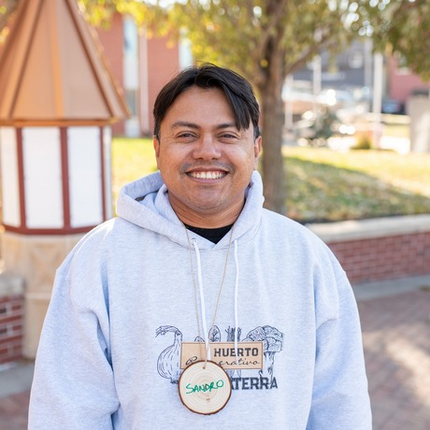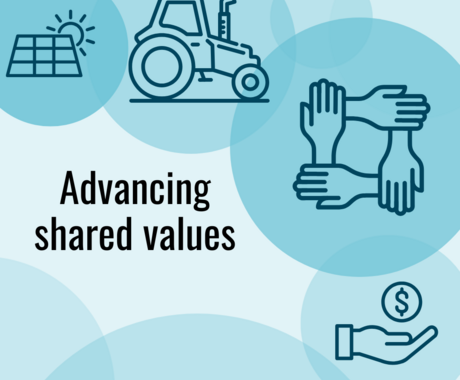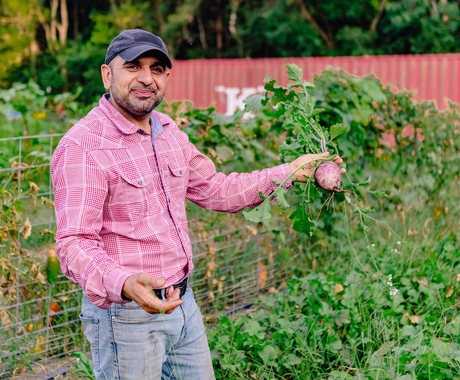Sandro Lopes describes his farm, Huerto Regenerativo NaTerra, as a place where nature and agriculture work in harmony.
Located in David City, Nebraska, the operation is rooted in Indigenous practices, inspired by the methods of Sandro’s ancestors from Brazil, who farmed in the heart of the Amazon rainforest.
“My farm honors the traditional knowledge passed down through generations,” he said. “It thrives on the principles of regeneration, where every decision we make is about giving back to the earth more than we take.”
Sandro has applied this principle across his Nebraska farm, where every part serves a purpose. He plants a diverse array of crops without the use of synthetic chemicals, and terracing and agroforestry prevent erosion and support wildlife habitat. Sandro also uses composting systems that recycle organic waste back into the soil, and native plants attract pollinators and other beneficial insects. Learn more about Sandro’s farm here.
To broaden his already expansive knowledge of conservation, Sandro applied for and was accepted as a Center for Rural Affairs Beginning Farmer Conservation Fellow. The project began in 2022 with eight individuals, plus mentors. The most recent cohort began in spring 2024 with eight beginning farmers, including Sandro.
“I have always been deeply passionate about environmental conservation and sustainability,” Sandro said. “The idea of dedicating my career to protecting natural ecosystems and promoting sustainable agriculture practices is something that drives me daily.”
Sandro’s interest in conservation began at a young age when he encountered the effects of habitat destruction in his local community in the Brazilian Amazon. This led him to pursue studies in agricultural and natural resources science and engage in various conservation projects.
“When I learned about the Center’s fellowship, I was immediately drawn to it,” he said. “The program’s focus on hands-on experience, research opportunities, and community engagement aligns perfectly with my career aspirations. The reputation of the Center for its innovative approaches and successful conservation initiatives further solidified my interest in applying.”
As part of the program, conservation fellows design and implement a project on their own farms or land they are farming. They present their findings at a farm tour to their mentors, project partners, and other beginning farmers.
For his project, Sandro chose to create a mandala garden, with a design that embodies the principles of both Indigenous and regenerative agriculture. According to Sandro, the circular, geometric layout of a mandala garden is not only aesthetically pleasing but highly functional.
“It maximizes space efficiency, promotes diversity, and allows for companion planting, which is key to maintaining a healthy, balanced ecosystem,” he said. “The mandala design also holds deep cultural significance, symbolizing unity and harmony, which aligns with my goal of creating a farming system that works in concert with nature rather than against it.”
So far, Sandro has completed the initial design and layout, prepared the soil, and started planting a variety of crops and beneficial plants.
“The early stages have involved a lot of planning and soil preparation, but I’m beginning to see the garden take shape,” he said “It’s been rewarding to see the plants thriving and the garden becoming more vibrant as time goes on.”
Looking ahead, he plans to continue refining the garden by introducing more plant diversity and experimenting with different companion planting combinations. As the garden matures, Sandro will focus on maintaining soil health through composting, mulching, and integrating more perennials that can help stabilize the ecosystem.
“I see the mandala garden becoming a central feature of the farm, demonstrating how regenerative practices can lead to a productive, resilient, and beautiful agricultural system,” he said. “My goal is to maintain and expand the garden, ensuring it remains a model of sustainable farming for years to come.”
Sandro eventually hopes to use the garden as a teaching tool, sharing the knowledge and techniques he’s learned with others in the community who are interested in sustainable agriculture.
“I want to host workshops and training sessions for other farmers, especially those from Indigenous and underrepresented communities,” he said. “I want to create a space where people can learn about regenerative practices, traditional agricultural methods, and the importance of conservation in a hands-on, supportive environment.”
Sandro believes it is crucial to engage the next generation in this work and help them understand the connections between healthy ecosystems, sustainable food systems, and community well-being.
“Overall, my farm is a living example of how traditional wisdom and modern sustainable practices can come together to create a thriving, resilient ecosystem,” Sandro said. “It’s a place where agriculture doesn’t just sustain us; it also sustains the land, ensuring that future generations can continue to benefit from its bounty.”
Many of Sandro’s ideas for the future of his farm have been inspired by his experiences as a conservation fellow.
“I have gained a deeper understanding of the intricate relationships between ecosystems, species, and human communities,” Sandro said. “The fellowship has also broadened my awareness of the global conservation landscape, introducing me to innovative approaches and inspiring projects from around the world.”
On a personal level, Sandro said being a conservation fellow reinforces his sense of responsibility and motivates him to continue to push boundaries, experiment with new techniques, and share his findings with others.
“Being named a conservation fellow is both a privilege and a call to action; a reminder that the work I do on my farm is part of a larger, global effort to protect and restore our planet,” he said. “It inspires me to keep striving for innovation, sustainability, and justice in all aspects of my work. It’s incredibly rewarding to be part of a community that values sustainability, conservation, and the wisdom of traditional agricultural practices.”
Be a 2025 fellow! For more information, visit cfra.org/beginning-farmer-conservation-fellowship-program.
The Beginning Farmer Conservation Fellowship is a program of the U.S. Department of Agriculture-Natural Resources Conservation Service under agreement number NR243A750003C010 Conservation Outreach: Equity Conservation Cooperative Agreements.





